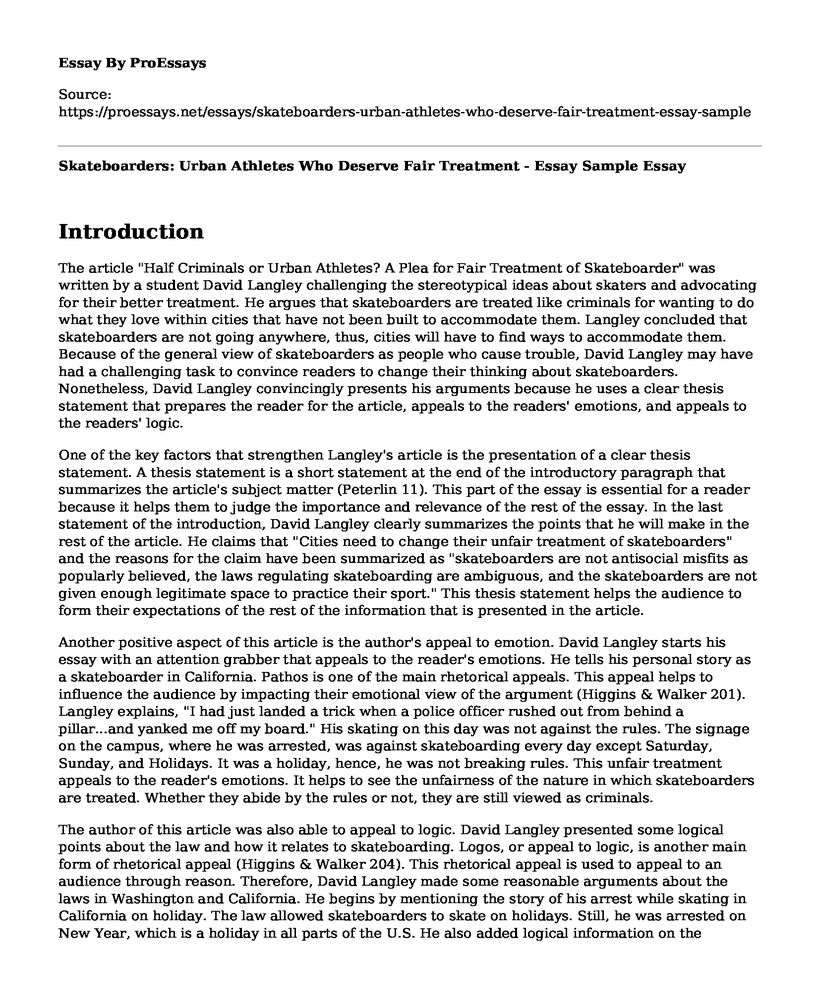Introduction
The article "Half Criminals or Urban Athletes? A Plea for Fair Treatment of Skateboarder" was written by a student David Langley challenging the stereotypical ideas about skaters and advocating for their better treatment. He argues that skateboarders are treated like criminals for wanting to do what they love within cities that have not been built to accommodate them. Langley concluded that skateboarders are not going anywhere, thus, cities will have to find ways to accommodate them. Because of the general view of skateboarders as people who cause trouble, David Langley may have had a challenging task to convince readers to change their thinking about skateboarders. Nonetheless, David Langley convincingly presents his arguments because he uses a clear thesis statement that prepares the reader for the article, appeals to the readers' emotions, and appeals to the readers' logic.
One of the key factors that strengthen Langley's article is the presentation of a clear thesis statement. A thesis statement is a short statement at the end of the introductory paragraph that summarizes the article's subject matter (Peterlin 11). This part of the essay is essential for a reader because it helps them to judge the importance and relevance of the rest of the essay. In the last statement of the introduction, David Langley clearly summarizes the points that he will make in the rest of the article. He claims that "Cities need to change their unfair treatment of skateboarders" and the reasons for the claim have been summarized as "skateboarders are not antisocial misfits as popularly believed, the laws regulating skateboarding are ambiguous, and the skateboarders are not given enough legitimate space to practice their sport." This thesis statement helps the audience to form their expectations of the rest of the information that is presented in the article.
Another positive aspect of this article is the author's appeal to emotion. David Langley starts his essay with an attention grabber that appeals to the reader's emotions. He tells his personal story as a skateboarder in California. Pathos is one of the main rhetorical appeals. This appeal helps to influence the audience by impacting their emotional view of the argument (Higgins & Walker 201). Langley explains, "I had just landed a trick when a police officer rushed out from behind a pillar...and yanked me off my board." His skating on this day was not against the rules. The signage on the campus, where he was arrested, was against skateboarding every day except Saturday, Sunday, and Holidays. It was a holiday, hence, he was not breaking rules. This unfair treatment appeals to the reader's emotions. It helps to see the unfairness of the nature in which skateboarders are treated. Whether they abide by the rules or not, they are still viewed as criminals.
The author of this article was also able to appeal to logic. David Langley presented some logical points about the law and how it relates to skateboarding. Logos, or appeal to logic, is another main form of rhetorical appeal (Higgins & Walker 204). This rhetorical appeal is used to appeal to an audience through reason. Therefore, David Langley made some reasonable arguments about the laws in Washington and California. He begins by mentioning the story of his arrest while skating in California on holiday. The law allowed skateboarders to skate on holidays. Still, he was arrested on New Year, which is a holiday in all parts of the U.S. He also added logical information on the confusing laws in Washington. David Langley asked for clarification about the skateboarding guidelines from officers at the Seattle East Precinct. The officer said that a skateboarder is allowed on the sidewalk as long as there are a few people, and they are moving at reasonable speeds. However, the officer admitted that he could arrest a lone skater anyway, and this would not lead to any significant issues with his superiors. The presentation of this conversation about the law in the essay is a reasonable argument that sheds light on the ambiguous nature of the law on skateboarders.
Conclusion
In conclusion, this analysis shows that David Langley was successful in using useful rhetorical tools to make his arguments convincing to the reader. The use of a clear thesis statement adds to the exciting nature of his article. A reader is prepared for the key points that they will read from the beginning of the article. Secondly, David Langley is successful in making the experiences of the skateboarders relatable. He uses an emotional appeal to help the audience to understand the dilemma of skateboarders who are seen as criminals while trying to practice their sport within legal bounds. Lastly, Langley appeals to logic by presenting logical arguments about the loopholes in the laws that control skateboarding. In the end, one is able to relate to his ideas about cities having to accommodate them.
Works Cited
Higgins, Colin, and Robyn Walker. "Ethos, logos, pathos: Strategies of persuasion in social/environmental reports." Accounting Forum. Vol. 36. No. 3. Taylor & Francis, 2012.
Langley, D. "Half Criminals or Urban Athletes? A Plea for Fair Treatment of Skateboarder" (n.d).
Peterlin, Agnes Pisanski. "The thesis statement in translations of academic discourse: an exploratory study." The Journal of Specialised Translation 10 (2008): 10-22.
Cite this page
Skateboarders: Urban Athletes Who Deserve Fair Treatment - Essay Sample. (2023, May 24). Retrieved from https://proessays.net/essays/skateboarders-urban-athletes-who-deserve-fair-treatment-essay-sample
If you are the original author of this essay and no longer wish to have it published on the ProEssays website, please click below to request its removal:
- Organizational Behavior Questions and Answers
- The Relationship Between Physical Fitness and Lifeguarding - Essay Sample
- Essay Sample on 1985 Chicago Bears: Rules, Norms & Unrepeated Success
- Essay Example on Supplements: Enhancing Exercise & Athletic Performance
- Essay Example on Student-Athletes: Sacrifices Needed to Excel in Sports
- Paper Example on itamin C: Nature's Antioxidant & Essential Metabolism Booster
- Research Paper Sample on Electrolytes: Critical for Muscles, Nerves & Hydration







